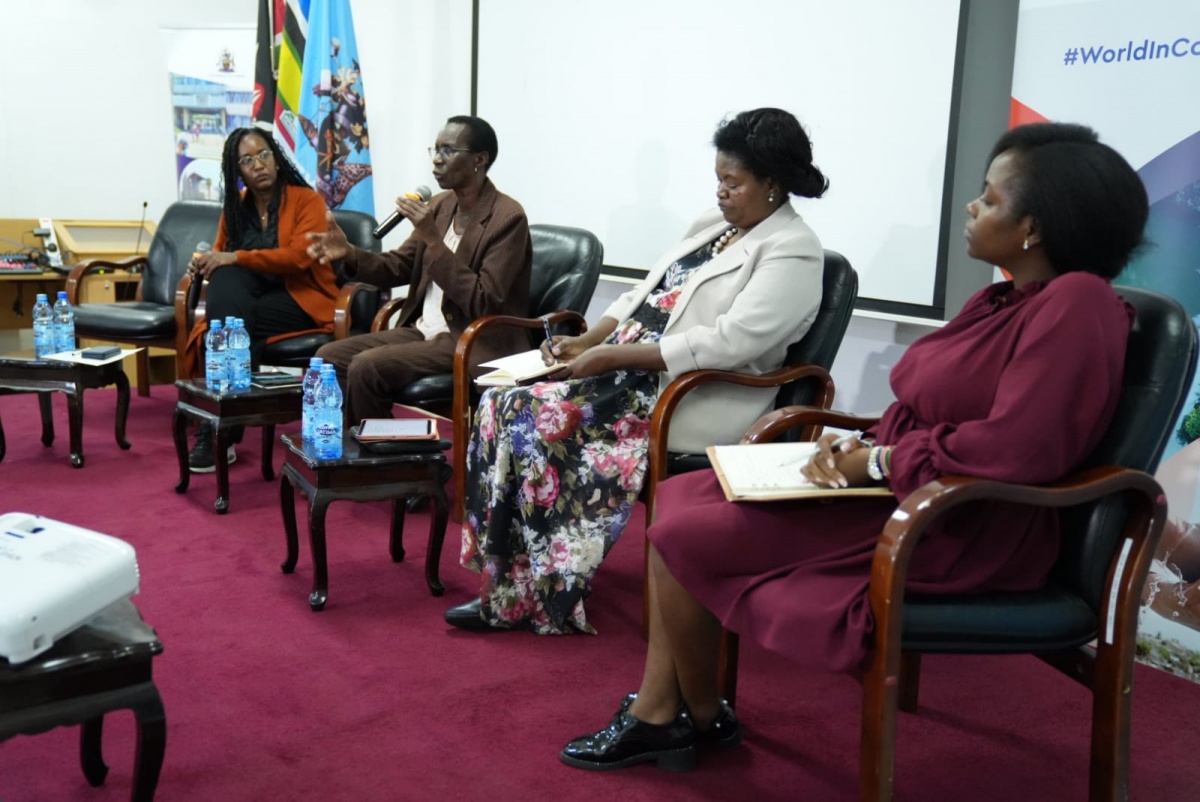Commemoration of International Day of Women and Girls in Science
On the 11th of February 2025, the University of Nairobi, in collaboration with the Embassy of France to Kenya and the AFD Groupe through the Directorate of Advancement and Institutional Development, proudly hosted a special event to celebrate the International Day of Women and Girls in Science. The event was held at the UoN Towers from 1 pm to 3 pm. The event was graced by H.E Arnaud Suquet, the ambassador of France to Kenya, the Director of the French Development Agency in Kenya, Ms. Anne-Gael Chapuis, Prof. Ayub Gitau, the Deputy Vice Chancellor of Academic Affairs. The
The objective of the event was to release a Gender baseline survey of women in science that was conducted at the University in 2024 by a team of researchers led by Prof. Winnie Mitullah.
The Chief Operations Officer and Director, University Advancement and Institutional Development, Mr. Brian Ouma, in his welcoming remarks, focused on the issue of gender equality as a necessity for the development of STEM disciplines. He remarked that the French Embassy’s and French Agency's partnership with the University of Nairobi made it possible to tackle the gender deficit in STEM areas. "Gender equality is not merely an issue of fairness; it is a necessity for sustainable development and innovation,"he noted, urging both men and women to support gender equity in science. The COO was represented by Marc Zolver.
Professor Ayub Gitau, the Deputy Vice Chancellor of Academic Affairs, University of Nairobi, represented the Vice Chancellor, he highlighted the efforts the university is putting towards improving the gender balance within the university’s science and engineering programs. He pointed out how more female students are enrolling to study engineering and other fields that have been considered male-dominated. Reflecting on some of the challenges that women continue to experience in these disciplines, Gitau remarked, "While progress has been made, we must acknowledge that much work remains to be done," He also mentioned the active steps taken by the university toward achieving gender balance at the top, with the appointment of women to head key faculties in law, engineering and even science.
Ms Anne-Gael, AfD Director, highlighted the role of women in Africa’s economic and scientific development. "Women have always been at the heart of societal progress, and we must empower them to play a central role in shaping the future of STEM," Mrs. Anne-Gael said. This is one of the many statements in her speech that inspired the audience and made them understand that women’s education and leadership in science need more focus.
' There are 31.7% women in Science globally, and the figures are slowly rising. There are structures and policies in place for women in science, but there is still fear and a stigma associated with the sciences.'
'More socio-cultural issues affect women getting into the sciences field, there are gaps in how society motivates women to get into science/ STEM courses, ' This was said by Prof. Winnie Mitullah, the keynote speaker of the day, as she released findings of the Gender Baseliner Survey for a study conducted for Women in STEM at the University of Nairobi in 2024.

'The data we collected revealed that while female students in science are doing well academically, there are other underlying societal barriers—like gender stereotypes and family expectations—that still affect their progress,” she stated.
"Effective implementation of all the policies that address affirmative action and women, addressing women in science through a gender lens has the potential of improving and increased sensitization of the policies' are some of the recommendations that she gave.
A panel discussion moderated by Caroline Kimeu reacted to the findings,the increasing drive for the indelible contribution of women in STEM in achieving this goal. She directed a critical question to the panelists, "Where are women in the course of industrialization? Are they lagging, or are they progressing?"
Prof.Ngila focused on the discrepancies in women's representation across all academic levels. She stated, “At the undergraduate level, the gender gap in STEM is still significant, but as we move into higher degrees, such as master’s and PhDs, we begin to see better gender balance.” Ngila continued, “However, there is still a long way to go in terms of supporting women at the doctoral and postdoctoral levels, where mentorship and funding remain major hurdles."
Addressing the importance of mentorship and role models, Rachel Kimemia pointed out that mentors are fundamental in inspiring more women to seek employment in STEM. "Women need to see others like them succeeding in these fields, without mentorship, many young women struggle to navigate the barriers they face, " she said. She also insisted that STEM education is ripe for systemic intervention in enabling women's access.
The panelists emphasized the fact that even with significant advancements, achieving gender equality in STEM fields remains a far-reaching objective. Professor Ngila implored that universities and research centers should not merely pay lip service to policies but also work towards creating nurturing spaces. "We need to ensure that women in STEM are not only given equal opportunities but are also provided with the tools and networks that allow them to thrive," she stated.
"Gender equality in STEM is not just about fairness, but also about building the future. Women and men must work together to break down the barriers that continue to limit women’s full participation in science and technology," she said.
The event symbolized the importance of supporting women by taking on leadership roles in science and technology. For the University of Nairobi and its collaborators, it was a significant chance to reaffirm the importance of gender equality in stem education.
